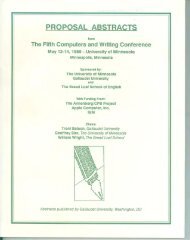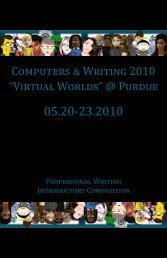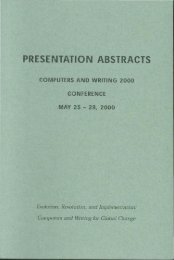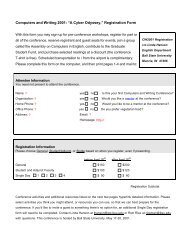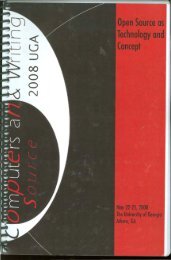CW2001 Program - Computers and Writing
CW2001 Program - Computers and Writing
CW2001 Program - Computers and Writing
Create successful ePaper yourself
Turn your PDF publications into a flip-book with our unique Google optimized e-Paper software.
Friday<br />
2:15 — 3:30 Session C.9<br />
Inhabiting Cyberspace:<br />
Synchronous Conferences <strong>and</strong> Metaconversing<br />
BC 129<br />
Joan Latchaw, moderator<br />
Kristina DeVoe <strong>and</strong> Chris Rausch<br />
“<strong>Writing</strong> Ourselves Online”:<br />
Negotiating Roles in the Electronic <strong>Writing</strong> Classroom<br />
The presenters closely examine their own multiple, unexpected, <strong>and</strong>,<br />
sometimes, clashing roles that emerged from observing <strong>and</strong>, later,<br />
mentoring students during a first-year composition class taught on<br />
the MOO in the Fall of 2000. By incorporating transcripts of the class<br />
discussion into the presentation, the presenters analyze <strong>and</strong> show how<br />
they approached group dynamics, community, <strong>and</strong> conflict resolution<br />
through the use of language strategies <strong>and</strong> language channels–<br />
especially in the context of emotes, directed speech, backchannel<br />
(paging <strong>and</strong> whispering), <strong>and</strong> their own physicality. Finally, they<br />
provide corresponding metaphors for novice instructors who are trying<br />
to negotiate their own roles within an online classroom environment.<br />
Trish Harris<br />
Synchronous Metaconversing:<br />
Active Social Construction of Knowledge<br />
This participatory session provides an experience quite unlike what we<br />
experience in our usual scholarly <strong>and</strong> classroom conversations, in which<br />
we tend to self-edit <strong>and</strong> compress. Out of consideration for others’ time,<br />
out of natural reserve, out of fear of being discovered “incorrect,” we<br />
tend to edit first thoughts, we mistake a text’s, or a conversation’s,<br />
surface for its depth-charge relevance. But if offered the freedom to<br />
risk being “right,” how do we react Do we appropriate Do we affront<br />
Do we oppose How do we engage the true subjects in our virtual<br />
discourse communities This active session attempts to socially<br />
construct answers to these questions <strong>and</strong> model ways our different<br />
languages can be explored in the writing classroom.<br />
50 <strong>Computers</strong> & <strong>Writing</strong> 2001



